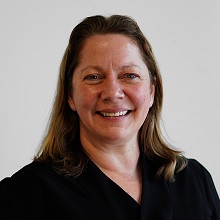28 September 2022
Quality enhancement through collaboration, trust and empowerment (a celebration of the Scottish approach)

Authors
Sir Paul Grice
Principal and Vice-Chancellor, Queen Margaret University, Edinburgh
Professor Catriona Bell
Director of Learning Enhancement & Academic Development,
Queen Margaret University, Edinburgh
‘How do YOU define quality in higher education today?’ This was the question posed to us by QAA colleagues when they invited us to contribute to QAA’s 25th anniversary publications.
To answer this question, our starting point was to reflect on how the definition of quality is influenced by our context and priorities at different levels:
- Our institution: Queen Margaret University (QMU), Edinburgh. We are a Scottish higher education institution with ~4200 students on a single campus near Edinburgh, and ~4500 students in collaborative partnerships.
- Our immediate sector: The Scottish tertiary sector. This is an increasingly integrated sector spanning higher education (HE) and further education (FE); comprising 19 HE institutions and 26 colleges (that deliver 20-25% of HE in Scotland).
- Our wider sector: A global HE sector, within which QMU offers transnational education (TNE), plus UK and online collaborative partnerships.
As we explored the question posed, we also found ourselves drawing from our earlier careers in Parliament and veterinary practice which provided us with our own individual contexts in relation to the word ‘quality’. We discussed the quality of parliamentary scrutiny and challenges around measuring the quality of debate, as well as the importance of quality in terms of patient care, client confidence, and education of the veterinary profession. Our reflections also flagged the importance of lifting our heads and looking beyond our sector to ask ourselves:
- Have we genuinely considered the term ‘quality’ from a full range of stakeholder perspectives?
- What would our local community, prospective students and their families, employers, patients, future overseas partners, or government officials say if we asked for their definition of quality in HE?
After recognising the fundamental importance of quality assurance (QA) to our institution, we then found our discussion moving beyond QA to focus on ‘quality as enhancement’ and consideration of how we achieve this. We talked extensively about this, but our key thoughts were distilled into the importance of a values-led approach that depends on ‘empowerment of’ and ‘trust in’ participants and partners, and which values collaboration, diversity of thought and fresh thinking.
It may not be a surprise to colleagues from Queen Margaret University that these elements came to the fore, as we are proud to be a values-led institution that is founded on social justice:
‘We value social justice. In fact it underpins our world view. We embrace equality, diversity, inclusion and respect and supporting our communities. Opportunities and access are open to all and on a fair basis.’ (QMU Strategic Plan 2020-25)
We were, however, interested to note that several elements chime with definitions of quality enhancement in Vicki Stott’s recent ‘Defining Quality’ policy note (HEPI Policy Note 33, 2022):
'There is another view of quality - one that is transformational. This is enhancement, a view of quality that moves it away from being rooted in a product or in fitness for purpose, and sees it instead as a process of changes (or enhancements) for participants. It allows for the collaborative, co-creational nature of higher education, embracing the idea that both students and academics may be changed by the process. It includes notions of value-added, where educational experience enhances the knowledge, skills and abilities of students; it introduces the notion of empowerment; and it assumes participants engage in and influence their own transformation.'
The fact that the focus of our reflections rapidly moved to quality enhancement (QE) is undoubtedly influenced by the Scottish HE sector’s adoption of an enhancement-led approach to quality* since 2003, facilitated by Scotland’s Quality Enhancement Framework (QEF). The QEF has catalysed collaboration, empowerment and trust between participants (students, staff and institutions) in Scotland for almost 20 years, and we agreed that this is very definitely something to celebrate.
The Scottish Quality Enhancement Framework (QEF)
Colleagues outside of the Scottish sector might be interested to know a little more about the QEF. It comprises five key elements that, to date, have included Enhancement Themes (collaborative cross sector work), Enhancement-Led Institutional Review (ELIR) (peer review), Institution-Led Reviews, student engagement (in all elements of the framework), and providing public information.
This enhancement-led approach embeds collaboration and partnership at its core, and over the past two decades all 19 HE institutions in Scotland have shared practice, engaged in peer review processes, and collaborated in sector-wide projects to enhance the quality of the student experience at Scottish institutions and more widely across the HE sector. Throughout this time colleagues at QAA Scotland have led the implementation of the QEF in partnership with the Scottish Government, sector agencies and all HE institutions in Scotland. This has not only provided a key route to assuring standards in Scottish HE, but has also expertly facilitated the connection and sharing of good practice on a regular basis at sector, institutional and individual level.
More recently, the Scottish Funding Council’s (SFC) ongoing Review of Coherent Provision and Sustainability has catalysed enhanced integration across the tertiary sector in Scotland. Tertiary quality arrangements are currently under development and proposed for implementation from 2024-25, and the ELIR method has recently been superseded by a new external institutional review method which is being developed within the context of the SFC review. Phase 1 of this method, which contains two components - Quality Enhancement and Standards Review (QESR) and Institutional Liaison Meetings (ILM) - will run between 2022 and 2024. The Phase 1 handbook will be published on QAA Scotland’s website early in the autumn.
This SFC review has also reinforced the crucial importance of student engagement in all aspects of quality, and we are fortunate to have sparqs, a Scottish sector agency, to continue to champion and facilitate this across the sector.
Having benefitted from being part of a powerful enhancement-led approach in Scotland, we have seen how impactful a collaborative, co-created approach can be for students, staff and institutions. At QMU this has been embedded through a variety of initiatives led by our staff and students. Our Governance and Quality Enhancement team have been fundamental to the success of this, working in partnership with the whole university community.
To conclude, the Scottish enhancement-led approach to quality is one of which we’re very proud. In QAA’s 25th anniversary year, it is a real pleasure to celebrate the fundamental role that QAA Scotland has played in promoting and enhancing quality across the Scottish HE (and now tertiary) sector through collaboration, trust and empowerment.
*For colleagues outside the Scottish sector: It may be of interest to know that we are funded by the Scottish Government through the Scottish Funding Council. The Office for Students does not have jurisdiction over Scottish HEIs, and as a result, participation in the Teaching Excellence Framework (TEF) is optional for universities in Scotland (and Wales and Northern Ireland).
Universities Scotland recently announced that all 19 Scottish HEIs have decided not to participate in the revised TEF (July 2022).

